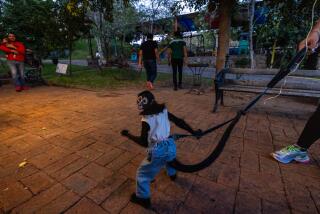A Vacation in the Tropics--but It’s Not All Monkey Business
- Share via
Why would a 52-year-old Torrance attorney with a high-rise office pay about $2,500 for the privilege of working for two weeks in the steamy Amazon rain forest with a group of people he doesn’t even know?
John Berger is doing it to fulfill a boyhood dream.
“The rain forest is exotic and alive with plants growing over each other, and I’ve wanted to go there ever since I saw the Disney movie, ‘Three Caballeros,’ in the 1940s,” Berger said. The closest he has ever come to the jungle before is in his own backyard, where he grows tropical plants and 10 different kinds of banana trees.
Next week, Berger will rendezvous in Bogota, Colombia, with seven people he will be meeting for the first time. From there, they will fly two hours over the Andes Mountains and land on the dirt runway of a village near the Apaporis River, a tributary of the Amazon. From there, they’ll walk for two hours to a lake they will cross by canoe, and then hike for several hours into the rain forest for a two-week stay.
But if this is a dream trip for Berger, it also has a scientific basis. He is going into the Colombian jungle as part of a research team from Earthwatch, a Massachusetts-based environmental research organization that sends enthusiastic amateurs to the world’s far corners to help under-financed scientists do field work.
“This fulfills my needs because I’ve always wanted to see a rain forest for myself and it is good for humankind,” said Berger, who admits that he lacks scientific experience. “This is a learn-as-you-do adventure.”
The team members--with notebooks, cameras and binoculars in hand--will record the movements of birds and monkeys as they eat fruit from trees and drop the seeds that sprout new trees. The project is part of an effort to persuade the Colombian government to protect its rain forest and thus save one corner of the South American wilderness from being wiped out by settlement and the ecological imbalance that results from the extermination of animals.
“One monkey carries one seed and if he disappears, that’s one less seed to grow one more tree for the other monkeys or birds,” Berger explained. “The tree supports life and if the tree dies, the animal dies. The ecological system works from animal to plant. They need each other, or no one survives.”
Far from getting a salary for his labors, Berger will pay $1,100 to Earthwatch and about $1,300 in round-trip air fare on top of that.
“It’s a vacation, but it’s work,” he said, explaining that everyone will carry his own gear and sleep in a thatched hut. “We get one day off.”
Berger said the jaunt is not without physical danger: “There are poisonous snakes, although I’m more worried about the political situation. There is a Communist insurgency in Colombia.”
He said he has no fears about making the trip, but almost everybody he knows is afraid for him. “If I were afraid of spiders or of snakes, I wouldn’t go,” he said. “I don’t like humidity, but I can tolerate it.”
And just to make sure that he has some light moments, Berger this week flew to Rio de Janiero to enjoy that non-stop party called Carnival. “I may need the rain forest to recover,” he said.
Berger, who lived in Hermosa Beach for 25 years before moving to Laguna Beach a year ago, received a degree in pharmacy in 1958 and worked as a pharmacist to put himself through law school in the early 1960s. Today, he specializes in pharmacy law out of a well-appointed Del Amo office.
“Pharmacy law is an unusual field,” Berger said, explaining that he spends a lot of time defending pharmacists in cases involving questionable dispensing of controlled drugs. “My practice is almost as exciting as going into the jungle.”
Berger was responsible for getting his own equipment for the jungle trip. It included mosquito netting--”It was hard to find that”--pants with big pockets, rain gear, a video camera and special packing material to keep the humidity from damaging it, and binoculars with an outer casing so they can take a little rough handling.
He also found a special kind of safari hat to help him with the humidity problem. It has a little fan attached to the brim.
Berger had a choice of taking a sleeping bag or a hammock. “I chose the hammock. I thought the little crawly things would have trouble crawling over the ropes.”
More to Read
Sign up for Essential California
The most important California stories and recommendations in your inbox every morning.
You may occasionally receive promotional content from the Los Angeles Times.













